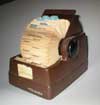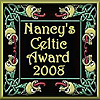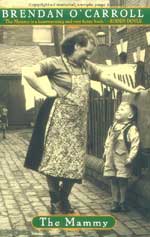| |

Traditions, folklore, history and more. If it's Irish, it's here. Or will be!
"People will not look forward to posterity who never look backward to their ancestors."
-Edmund Burke




Quotes
Library: Books, Movies, Music
Prints & Photos
Poetry
Jokes


Shops Ireland
Bunús na Gaeilge
(Basic Irish)
Circle of Prayer
Blessings
Did You Know?
Himself/Herself
Write to Us
Readers Write..
Links/Link to Us
Advertise with us
Awards & Testimonials
Submissions Guide


|
|
|
A Powerful Woman
by Bridget Haggerty
 She stood about five nothing and never weighed more than 100lbs her entire life. My father, at just 5'9", towered above her and worshipped the ground she walked upon. She stood about five nothing and never weighed more than 100lbs her entire life. My father, at just 5'9", towered above her and worshipped the ground she walked upon.
I don't know how they met. It's all shrouded in mystery. But, somehow, a young man from Galway met a young colleen from Dublin - in England. I like to think that when they first met, they embraced the idea of beginning a new life together. Whether they meant to or not, it's exactly what they did. Because it was from their love affair that I came to be.
Helena Kenny was born in Dublin in 1912. All of the years she was with us, my brothers and I believed what she had told us - that she had been born on New Year's Eve. It wasn't until recently we discovered that her real birth date was a day earlier - December 30th. But, when I was growing up, we celebrated her birthday on the same day that the entire world was throwing a party. In retrospect, I feel that she was entitled to the universe popping its cork in her honor.
Not once can I remember her raising her voice to me or my brothers. But she could certainly get her point across. I grew to be about 5'6' in my early teens and any time I gave her lip, she'd simply reach up and grab for my hair. All she had to say was "Don't be vexing your father." Interpreted today, that meant wait until your dad gets home. Strange, in this era of parents trying to be pals with their off-spring, I was terrified of upsetting my dad. And, so were my brothers. The same was true of our friends. All of us were scared of making our parents mad.
Helena became Lena and that's the name everyone called her. She and my dad did their best to make a good life for our family. He was a painter and decorator and she was a char lady. I'll save his story for another time. Hers, I want to tell now because this is a tribute to Lena O'Flaherty on Mother's Day.
 When she was 12, her mother died. She was the oldest and it fell to her to leave school so that she could take care of her brothers and sisters. While I meet people all the time who can't trace their roots in Ireland, I owe it to my mother that I know living relatives on her side of the family. She wrote back and forth to them frequently. Letters that someday, I want to publish. She wrote exactly as if she was having a conversation - never a worry about punctuation, grammar or spelling. It was as if you could close your eyes and she was talking to you. God, how I miss those letters. When she was 12, her mother died. She was the oldest and it fell to her to leave school so that she could take care of her brothers and sisters. While I meet people all the time who can't trace their roots in Ireland, I owe it to my mother that I know living relatives on her side of the family. She wrote back and forth to them frequently. Letters that someday, I want to publish. She wrote exactly as if she was having a conversation - never a worry about punctuation, grammar or spelling. It was as if you could close your eyes and she was talking to you. God, how I miss those letters.
I remember feeling embarrassed about what she did for a living; but the years have taught me to appreciate what she meant to the people for whom she worked. Is there such a thing as a society cleaning woman? Perhaps it was her charm, her incredible good looks, or simply that she worked like a dog, that her client list - with unpublished phone numbers - would have been the envy of social climbers all over the world. There was the dignitary from India who offered to relocate our entire family and make us very comfortable if Lena would accompany them back home. There was the Scottish family - I think he was a knight - who gave her cast-off records which she brought home and gave to me. I'd like to say that the recordings were in the Celtic vein, but they weren't. To the Sinclairs, wherever you are today, thank you for introducing me to jazz and classical music.
Life with my dad in the early years, especially after all three of the children were in the picture, began great but quickly turned very difficult. He owned a business which he lost because of illness and, in the end, he and my mother ended up scratching out a living. It wasn't physically as disastrous as the famine years in Ireland. But, emotionally and psychologically, it was devastating for my parents.
There were times I wondered how my mother put food on the table; deep in my subconscious, I had buried the memory of her "borrowing" food from the local grocery store. In her mind she wasn't stealing. I know her intention was to repay what she had taken. Today, I am no longer ashamed of what she did. I'd do the same if it meant the difference between my kids eating or not.
Lena was a devout Roman Catholic who went to Mass every day but wouldn't accept Communion, because she thought she couldn't. When I tell my dad's story, I'll explain why. In any case, it must have been incredibly difficult for her. But, no matter what life handed her - or what she handed back - Lena was always a lady. I can't recall even one swear word ever escaping her lips. But I do remember the personal invitation she received to a special reception honoring Lord Mountbatten. If I can find the photo, I'll post it here.
The thing about Lena is that everyone loved her. On a flight from London to the U.S., she just happened to be seated next to Buddy LaRosa, a leading businessman in the city I now call home. My mother was always a white-knuckle flyer and Buddy, sensing that she was nervous, introduced himself and tried to calm her down. By the time they walked off the plane together, she had an invitation to tea at the La Rosa mansion.
She was just a slip of a girl, as my father would say, but she exuded such warmth and energy that she was like a magnet - attracting people from all walks of life. To her, it didn't matter whether you were rich and famous or poor and down-trodden. She treated every one the same way - always with kindness and a sweet generosity that sometimes got out of hand; the problem was that she expected to be treated in the same way. It became a standing joke in our family that if Lena had said "I'll have that" to the Pope himself, he would have given her whatever she had her eye on. I remember a friend of ours taking her to lunch. With the glee and giggles of a little girl, she expressed as only she could, how much she loved this, that and the other. They walked out of the restaurant carrying a shopping bag filled with "souvenirs"; freely given by a restaurant owner who is probably still scratching his head and wondering how this little lady had persuaded him to part with place settings, napkins, a menu and more. Plus, he'd given her lunch on the house!
It was like that wherever she went. The curious part was that she never kept any of the things people gave her. It was as if she was put on earth to be a conduit through which something was given to be passed on to someone who needed it more. I remember when I went home for her funeral, my brothers and I looked through her dresser drawers. They were filled with beautiful gifts that had never been used; unopened bottles of perfume, sealed boxes of talcum powder, blouses and sweaters still in the boxes they came in. It was obvious that she meant to give them away. One of the items was a brand new nightgown which had a delicate pattern of roses across the yoke. Lena was an avid gardner and her rose bushes were always a source of great pride and joy. I couldn't bring back a bush, so I took the nightie. That was many years ago, but I still have it. It's almost threadbare and the roses have long since faded, but I like to think that it's on the nights I wear it to bed that she visits me in my dreams.
In those magical moments when we are once again chatting over a cup of tea, I am captivated and entranced by the lilt of her Dublin accent, the odd way she would say folly instead of follow, how she would address every man she met as sir - even the rag and bone picker; the quaint expressions that peppered her conversation. When we'd badger her about what was for dinner, she always said "a run around the table and a duck underneath." Or when we were dawdling before church - "you'll be so late going to Mass, you'll meet yourself coming back."
Most of all, I remember how much she adored my father. And his passion for her. Usually a stiff, somewhat gruff man, whenever he looked at Lena, his eyes always become soft and dreamy. It was from him that I first heard her described as "a powerful woman." Indeed, she was. And still is.
|
|
Fri, Sep 27, 2024
 The Galway Hooker The Galway Hooker
This unique vessel, with its distinctive curved lines and bright red sails, originated in the village of Claddagh. During the 19th century, hookers supported a significant fishing industry and also carried goods, livestock and fuel. Seán Rainey is remembered for building the last of the original boats, the Truelight, for Martin Oliver who was to become the last king of the Claddagh; as king, he was entitled to white sails on his boat. Since the mid seventies, many of the old sailing craft which were on the verge of extinction have been lovingly restored and new ones have been built. During the summer months they can be seen at festivals such a Cruinniú na mBád - the Gathering of the Boats - in Kinvara.
Click for More Culture Corner.
|
The Mammy
by Brendan O'Carroll

I picked up this book when I was looking for something different to read and based solely on the cover blurbs, and was NOT disappointed! This was one of the funniest, sweetest, most charming books I've read in YEARS!!
Brendan O'Carroll has a gift for telling a story and he's told a wonderful one in "The Mammy". He weaves sights, sounds, people, and places into an enjoyable tale of a young, widowed mother of seven very different, but all loving, children.
Click here for The Mammy
|
A must read for all Irish women. Especially endearing was the story called "Trinity" written by Kerry Herlihy. A moving book. Click here for Motherland.
|
|
|
|
|




 The Galway Hooker
The Galway Hooker